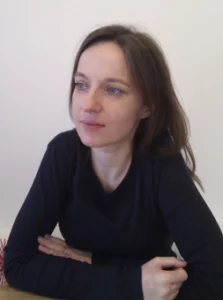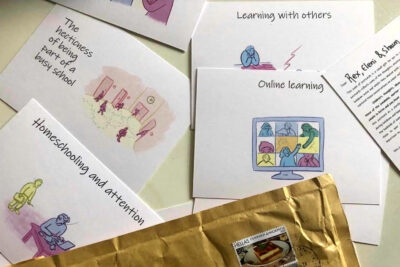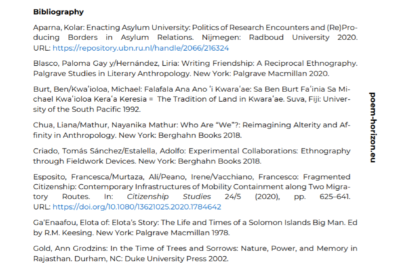Futures of Participatory Memory Work (online via Zoom)
POEM Closing Conference
Fresh approaches to open, participatory and socially inclusive memory work in contemporary digital media environments.
4.-5. March 2022
via Zoom
University of Hamburg
Edmund-Siemers-Allee 1
20146 Hamburg
About the conference
The POEM closing conference “Futures of Participatory Memory Work” will discuss fresh approaches to open, participatory and socially inclusive memory work in contemporary digital media environments. Opening a new chapter of participatory memory practices, the POEM European Training Network launches its transformation into a Community of Practice, a forum for practitioners, researchers, civil society organizations, memory organizations, social and cultural entrepreneurs as well as ordinary people who are interested in fostering participatory memory work.
Being aware of the fact that culture may cultivate integrative or disruptive forces, the POEM project started in 2018 with the intention of seeking concepts, strategies and media infrastructures to establish inclusive politics of heritage for envisioning possible futures. Contemporary debates address “difficult” and dissonant heritages that contest European public memory in respect to the representation of colonial legacies, immigration, multiculturalism and transnational history, diverse religious heritages, female heritages, or the inclusion of disadvantaged groups. Being part of public memory is important, because it acknowledges group histories, identities and belongings, and aids the envisioning of positive possible futures. It further supports certain group members’ eligibility claims for public support and redemption, the partaking in economic outcomes or clarifies ownership questions of cultural heritage resources. Another topic that dominates debates on socially inclusive public memory is the emergence of networked media infrastructures that are characteristic of mediatized and globally connected societies. Public memory institutions, like libraries, archives, and museums, have integrated digital media into their participatory memory work, which poses new questions of ownership, access and public engagement. Accordingly, the participatory turn in memory work, essential for a socially inclusive public memory, turns out to be far more difficult in practice.
After 36 months of research, conducted by 13 PhD fellows in 5 countries and 7 academic and non-academic institutions, we are pleased to discuss newly gained insights and ideas with a large network of people. The closing conference will elaborate on strategies and practices of public memory institutions as well as of individuals and groups, who take advantage of digital technologies and social media to connect publicly, share materials, and participate in remembering, commemorating, or celebrating events, people and ideas. How these memory practices can be woven together in participatory and forward-looking ways, is a central concern of the project’s final conference. We hope that these discussions will be the starting point to further develop and foster the opening-up of memory work towards socially inclusive futures across Europe and beyond.
About POEM
The H2020 European Training Network addresses the urgent need of experts in the heritage sector who are qualified for working with the mediatized memory ecology, the changing socio-technical, organisational, legal, economic, and ethical frameworks for the use of cultural materials. They will have the capacity to mediate between the stakeholder’s memory institutions, civil society, and creative and digital/IT industries for empowering people across Europe and for initiating future-envisioning creativity and innovation promoting socially inclusive memory practices.
Updated Conference Programme
Prior to the conference (1st-4th March): Watch the POEM fellows pre-recorded research videos!
Friday 4th March
13:45 Arrival/Virtual Joining
14:00 Opening Remarks and Introduction
14:30 Keynote Prof. Dr. Areti Galani
15:30 Discussion: Connectivities Built by Institutions*
Break
16:25 Discussion: Connectivities Built by People and Groups*
Break
17:20 Discussion: Connectivities Built by Memory Modalities*
Break
18:15 Synthesis I: Participatory Memory Practices (commentary & conversation)
*building on pre-recorded research videos
Zoom Link Day 1 (only works if you are registered for the conference)
Saturday 5th March
12:15 Arrival/Virtual Joining
12:30 Speed-Dating to find topics/themes to discuss for the co-creative session
13:30 Co-Creative Session
Break
16:00 Syntheses II: Envisioning Possible Futures – #memoriesconnect, POEM Toolbox,
Launch of POEM Book Series and the POEM Community of Practice
Zoom Link Day 2 (only works if you are registered for the conference)
For a more detailed program, see KH8_timetable_hybrid-conference_22-02-09(1).
Keynote Prof. Dr. Areti Galani
Senior Lecturer in Digital Cultural Heritage and Degree Programme Director (Museum, Gallery and Heritage Studies) at Newcastle University
Sticky tape, museums in orbit and the authenticity bunny: emerging values and responsibilities in the futuring of memory practices
Can futuring methodologies open a critical space for heritage and memory work? How can we bring into dialogue imagined participatory memory futures with current practice? What are the values and responsibilities emerging from ‘inhabiting’ the future in the present? This talk will reflect on empirical work from two heritage futurescaping workshops that were carried out in the context of the EU-funded project CoHERE (Critical Heritages: Performing & representing identities in Europe). The participants in the workshops were asked to ‘inhabit’ and negotiate futures in which memory and heritage work interfaced with challenges emerging from post-truth politics, artificial intelligence agency and profusion of digital/material heritage resources. Drawing on examples of practices and artefact designed by the participants, the presentation discusses how responsibilities of cultural institutions connected to access, truth and authenticity are being re-imagined and the questions they raise for future action. The talk also reflects on the challenges and opportunities of using futuring participatory methodologies in memory and heritage research and practice.

Fellows’ Research Videos
Conference Venue (now via Zoom)
University of Hamburg
Institute of Anthropological Studies in Culture and History
Edmund-Siemens-Allee 1 (West Wing)
20146 Hamburg
Lecture Hall (Room 221, 2nd floor)
POEM Community of Practice
Communities of Practice (CoP) form around emerging problems or tasks of everyday life. They bring together people with varied knowledge backgrounds and levels of expertise, which matter decisively for coping with these challenges by learning from one another. Rethinking memory making practices in Europe as more participatory, socially inclusive and future-envisioning requires a broad spectrum of knowledge, expertise, know-how, competencies, capabilities, proficiency and a broad basis of people for fostering these in their particular contexts and fields of work. The POEM Innovative Training Network (ITN) will provide knowledge for initiating these new approaches to memory making by creating genuine connectivities across memory institutions, people and groups and memory modalities (i.e. the particular modes of building memories in today’s digital media ecologies).
Further literature
Lave, Jean (1991): Situated learning: Legitimate peripheral participation. New York.
Tools and Services
Becoming practical and organizing change towards participatory memory practices is easy and complicated at the same time. It needs a modification of mind sets and a long breath – like all change processes. In this section we collect and provide tools and services for getting started with participatory memory practices in digital media ecologies. It provides information for mundane, practical problems in the eclectic mode of emerging questions, without aiming for completeness or systematization.
Memory Postcards of Schooling during Covid
“My digital Legacy” Booklet
Reading list on collaborative research
Covid-19 information from University of Hamburg
Since the situation can change at any time we refer to the current Covid-19 regulations of the University of Hamburg in the coronavirus FAQ, so be sure to keep abreast of the updates, which you can find here. The FAQ will be updated regularly.
For further information on how the conference will be organised keep track on this website.
Thank you for your understanding.
Newsletter
If you want to make sure you are up to date with POEM, please sign up to our newsletter. We will keep you informed on a regular basis via email of news from the European Training Network POEM, its partners, and projects.
Please be aware of the terms & conditions concerning data protection.
POEM
Coordination and Project Management
University of Hamburg
c/o: Institute for Anthropological Studies in Culture and History
Grindelallee 46 | postbox: H8 | 20146 Hamburg | Germany
+49 (0)40 42838-9940
Concepts, strategies and media infrastructures for envisioning socially inclusive potential futures of European Societies through culture.
This project has received funding from the European Union’s Horizon 2020 research and innovation programme under the Marie Skłodowska-Curie grant agreement No. 764859.




